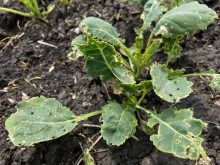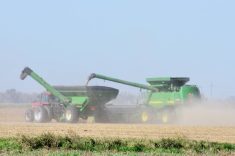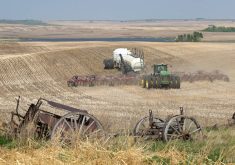It’s time to think about what lies below our feet.
That was the message delegates from 35 countries received from multiple speakers at the recent Global 4-H Summit in Ottawa.
Soil health emerged from several workshops during the third day of the July 11-14 conference, themed around sustainable agriculture and food security.
Syngenta Canada, also the sponsor of the day, was looking for 4-H member perspective on their incoming soil health kits, to be developed and distributed as part of a recently renewed partnership with 4-H Canada.
Read Also

CUSMA access key among other trade noise: Seeds Canada panel
Seeds Canada conference panelists say Canada needs to stay focused and wait as U.S. trade and tariff chaos develops, and a Canada-U.S.-Mexico Agreement review looms
The agreement will also target sustainable agriculture and food security, Chris Davison, Syngenta Canada head of corporate affairs, said.
The company has previously backed programs such as the pollinator-friendly “Proud To Bee a 4-H’er.”
Syngenta’s summit workshop attendees were asked to share soil issues from their regions, suggest kit composition and identify topics that the kits and surrounding education should cover.
“I think what struck me was the engagement and the passion of the people in the room,” Davison said. “The reason we structured the session the way we did is that when we partner with organizations like 4-H… we want to partner in a way and develop resources that are going to be meaningful, effective and utilized by the membership and the individual clubs across the country and I don’t think there’s a better way to do that than solicit the input of the people who are on the ground who are either part of those clubs or running those clubs.”

Kits will be released in Canada although session attendees ranged from across North America and overseas.
“I think everybody is working towards a common cause and there’s some great suggestions that came out of this room,” Clare Wooding, Syngenta Canada internal communications specialist, added. “There were some amazing perspectives that were shared on what people are doing to address the challenges of soil health from many different types of production.”
Feedback from the Global 4-H Summit will be used to develop the final kit, the two Syngenta Canada representatives said. Davison expects the company will analyze material from the brainstorming session and confer with 4-H Canada before development.
Davison expects the project to be one of several born out of the agreement.
No release date for the kits has been announced.
Manitoba represented
Clayton Robins, an avid cover crops advocate, Nuffield scholar and one of several Manitoba presenters at the four-day summit, also focused on soil and its role in climate policy.
“Initially, it was talking about the whole concept of critical thinking and how we apply that with the overwhelming amount of information that comes to us these days,” he said. “So, it was really targeted towards the young adults in this conference and initially, really, around the concept of climate change. As we know, there’s some very conflicting information around climate change, from what’s been measured to what’s being predicted.”
Robins presented soil health as a possible tool for improved sustainability and combating climate change.
“Regardless of what you’re driven by, it’s a good thing to do because it’s been so badly degraded,” he said.
Some progress has already been made, according to a 2015 report developed for the UN Food and Agriculture Organization (FAO) International Year of Soils. Soil erosion and soil salinity risk in the Prairies decreased from 1981 to 2011 and organic matter rose due to better land use and management, including 4.8 million more hectares of permanent cover in agricultural areas, the report said. As of 2011, 85 per cent of the agricultural Prairie region was considered to have very low risk of salinization.
Within Manitoba, however, pockets of moderate or higher risk remained in southwest and south-central regions. Western Manitoba also noted large increases in soil carbon from 1981-2011, although much of central and eastern Manitoba saw little change.
Compaction was still noted as a concern in wetter soils and nutrient imbalance — in particular, its effect on water quality and Lake Winnipeg — got special mention in the report. The FAO also noted a lack of soil biodiversity monitoring.
Robins introduced his listeners to the “Soil Your Undies” campaign, a project introduced by the Innovative Farmers of Ontario and later adopted by the Soil Conservation Council of Canada and Canadian 4-H’er Michael Jones, who earned a trip to the 2016 Canada-Wide Science Festival with an experiment based off it.
The campaign buries cotton underwear for two months and measures biological activity through decomposition.
Robins was not handing out underwear, but session attendees were handed swatches of cotton to be used for the same purpose.
“We all agreed to bury them on July 21 and dig them back up on Sept. 15 on the Friday evening and share our photos around on Instagram with the hashtag for the conference,” Robins said.
The summit adopted the hashtag #Global4HSummit for the week.
Most youth attending his session were North American born, Robins said, although some intercontinental adults attended and may be sharing experiment results from more exotic soils come September.
“It wasn’t about changing the world. That’s hard for people to do,” Robins said. “My challenge to them today was, ‘Go home and change the conversation.’”




















